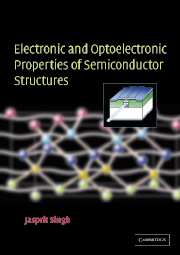Book contents
- Frontmatter
- Contents
- PREFACE
- INTRODUCTION
- 1 STRUCTURAL PROPERTIES OF SEMICONDUCTORS
- 2 SEMICONDUCTOR BANDSTRUCTURE
- 3 BANDSTRUCTURE MODIFICATIONS
- 4 TRANSPORT: GENERAL FORMALISM
- 5 DEFECT AND CARRIER–CARRIER SCATTERING
- 6 LATTICE VIBRATIONS: PHONON SCATTERING
- 7 VELOCITY-FIELD RELATIONS IN SEMICONDUCTORS
- 8 COHERENCE, DISORDER, AND MESOSCOPIC SYSTEMS
- 9 OPTICAL PROPERTIES OF SEMICONDUCTORS
- 10 EXCITONIC EFFECTS AND MODULATION OF OPTICAL PROPERTIES
- 11 SEMICONDUCTORS IN MAGNETIC FIELDS
- A STRAIN IN SEMICONDUCTORS
- B EXPERIMENTAL TECHNIQUES
- C QUANTUM MECHANICS: USEFUL CONCEPTS
- D IMPORTANT PROPERTIES OF SEMICONDUCTORS
- INDEX
8 - COHERENCE, DISORDER, AND MESOSCOPIC SYSTEMS
Published online by Cambridge University Press: 05 June 2012
- Frontmatter
- Contents
- PREFACE
- INTRODUCTION
- 1 STRUCTURAL PROPERTIES OF SEMICONDUCTORS
- 2 SEMICONDUCTOR BANDSTRUCTURE
- 3 BANDSTRUCTURE MODIFICATIONS
- 4 TRANSPORT: GENERAL FORMALISM
- 5 DEFECT AND CARRIER–CARRIER SCATTERING
- 6 LATTICE VIBRATIONS: PHONON SCATTERING
- 7 VELOCITY-FIELD RELATIONS IN SEMICONDUCTORS
- 8 COHERENCE, DISORDER, AND MESOSCOPIC SYSTEMS
- 9 OPTICAL PROPERTIES OF SEMICONDUCTORS
- 10 EXCITONIC EFFECTS AND MODULATION OF OPTICAL PROPERTIES
- 11 SEMICONDUCTORS IN MAGNETIC FIELDS
- A STRAIN IN SEMICONDUCTORS
- B EXPERIMENTAL TECHNIQUES
- C QUANTUM MECHANICS: USEFUL CONCEPTS
- D IMPORTANT PROPERTIES OF SEMICONDUCTORS
- INDEX
Summary
INTRODUCTION
In the previous chapters on transport we have applied Born approximation or the Fermi golden rule to describe the scattering processes in semiconductors. While the approach described in these chapters and the outcome is most relevant to modern microelectronic devices there are a number of important issues that are not described by this approach. As semiconductor devices and technology evolve, these issues are becoming increasingly important. In this chapter we will discuss some transport issues that are not described by the formalisms of the previous three chapters.
In Fig. 8.1 we show several types of structural properties of materials. In Fig. 8.1a we show a perfect crystal where there are no sources of scattering. Of course, in a real material we have phonon related fluctuations even in a perfect material. However, for short times or at very low temperatures it is possible to consider a material with no scattering. There are several types of transport that are of interest when there is no scattering: i) ballistic transport, where electrons move according to the modified Newton's equation. This kind of transport has been discussed in Section 7.3.2; and ii) Bloch oscillations, where electrons oscillate in k-space as they reach the Brillouin zone edge, as will be discussed in Section 8.2. In addition we can have tunneling type transport as well as quantum interference effects. These are discussed in Sections 8.3 and 8.4.
- Type
- Chapter
- Information
- Publisher: Cambridge University PressPrint publication year: 2003
- 1
- Cited by



